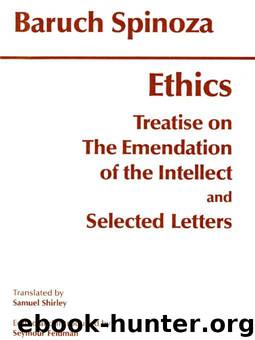Ethics (Translated & Annotated) by Baruch Spinoza

Author:Baruch Spinoza [Spinoza, Baruch]
Language: eng
Format: epub
Tags: ebook, book
Publisher: Hackett Publishing
Published: 2011-01-27T05:00:00+00:00
The emotion called a passive experience is a confused idea whereby the mind affirms a greater or lesser force of existence of its body, or part of its body, than was previously the case, and by the occurrence of which the mind is determined to think of one thing rather than another.
Explication
I say in the first place that an emotion, or passivity of the mind, is a ‘confused idea.’ For we have demonstrated (Pr.3,III) that the mind is passive only to the extent that it has inadequate or confused ideas. Next, I say ‘whereby the mind affirms a greater or less force of existence of its body or part of its body than was previously the case.’ For all ideas that we have of bodies indicate the actual physical state of our own body rather than the nature of the external body (Cor.2,Pr.16,II). Now the idea that constitutes the specific reality of emotion must indicate or express the state of the body or some part of it, which the body or some part of it possesses from the fact that its power of activity or force of existence (vis existendi) is increased or diminished, assisted or checked. But it should be noted that when I say ‘a greater or less force of existence than was previously the case,’ I do not mean that the mind compares the body’s present state with its past state, but that the idea that constitutes the specific reality of emotion affirms of the body something that in fact involves more or less reality than was previously the case. And since the essence of the mind consists in this (Prs. 11 and 13, II), that it affirms the actual existence of its body, and by perfection we mean the very essence of a thing, it therefore follows that the mind passes to a state of greater or less perfection when it comes about that it affirms of its body, or some part of it, something that involves more or less reality than was previously the case. So when I said above that the mind’s power of thinking increases or diminishes, I meant merely this, that the mind has formed an idea of its body or some part of it that expresses more or less reality than it had been affirming of it. For the excellence of ideas and the actual power of thinking are measured by the excellence of the object. Lastly, I added ‘by the occurrence of which the mind is determined to think of one thing rather than another’ in order to express the nature of desire in addition to the nature of pleasure and pain as explicated in the first part of the definition.
Download
This site does not store any files on its server. We only index and link to content provided by other sites. Please contact the content providers to delete copyright contents if any and email us, we'll remove relevant links or contents immediately.
The remains of the day by Kazuo Ishiguro(8999)
Tools of Titans by Timothy Ferriss(8396)
Giovanni's Room by James Baldwin(7346)
The Black Swan by Nassim Nicholas Taleb(7129)
Inner Engineering: A Yogi's Guide to Joy by Sadhguru(6794)
The Way of Zen by Alan W. Watts(6614)
The Power of Now: A Guide to Spiritual Enlightenment by Eckhart Tolle(5781)
Asking the Right Questions: A Guide to Critical Thinking by M. Neil Browne & Stuart M. Keeley(5775)
The Six Wives Of Henry VIII (WOMEN IN HISTORY) by Fraser Antonia(5515)
Astrophysics for People in a Hurry by Neil DeGrasse Tyson(5189)
Housekeeping by Marilynne Robinson(4447)
12 Rules for Life by Jordan B. Peterson(4304)
Ikigai by Héctor García & Francesc Miralles(4274)
Double Down (Diary of a Wimpy Kid Book 11) by Jeff Kinney(4272)
The Ethical Slut by Janet W. Hardy(4253)
Skin in the Game by Nassim Nicholas Taleb(4248)
The Art of Happiness by The Dalai Lama(4130)
Skin in the Game: Hidden Asymmetries in Daily Life by Nassim Nicholas Taleb(4006)
Walking by Henry David Thoreau(3962)
